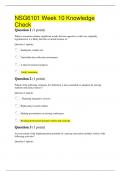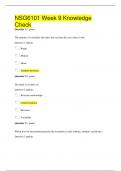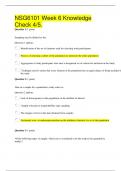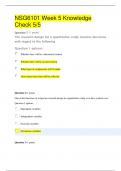NSG6101 (NSG6101)
South University
Alle 18 resultaten
Sorteer op
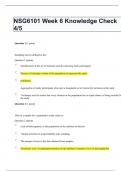
-
NSG6101 Week 6 Knowledge Check 4/5
- Tentamen (uitwerkingen) • 4 pagina's • 2024
-
 TheInstructor
TheInstructor
-
- $10.89
- + meer info
NSG6101 Week 6 Knowledge Check 4/5 Question 1 (1 point) Sampling may be defined as the: Question 1 options: Identification of the set of elements used for selecting study participants Process of selecting a subset of the population to represent the entire population Aggregation of study participants who meet a designated set of criteria for inclusion in the study Technique used to ensure that every element in the population has an equal chance of being included in the stu...
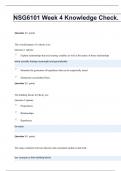
-
NSG6101 Week 4 Knowledge Check.
- Tentamen (uitwerkingen) • 4 pagina's • 2024
-
 TheInstructor
TheInstructor
-
- $10.49
- + meer info
NSG6101 Week 4 Knowledge Check. Question 1 (1 point) The overall purpose of a theory is to: Question 1 options: Explain relationships that exist among variables as well as the nature of those relationships Stimulate the generation of hypotheses that can be empirically tested Summarize accumulated facts Question 2 (1 point) The building blocks for theory are: Question 2 options: Propositions Relationships Hypotheses Question 3 (1 point) T...
NSG6101 Week 10 Knowledge Check correct answers provided
NSG6101 Week 9 Knowledge Check
NSG6101 Week 6 Knowledge Check 4/5
NSG6101 Week 5 Knowledge Check 5/5
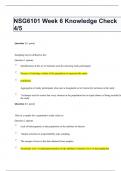
-
NSG6101 Week 6 Knowledge Check 4/5
- Tentamen (uitwerkingen) • 4 pagina's • 2024
-
 QUICKEXAMINER
QUICKEXAMINER
-
- $9.49
- + meer info
NSG6101 Week 6 Knowledge Check 4/5 Question 1 (1 point) Sampling may be defined as the: Question 1 options: Identification of the set of elements used for selecting study participants Process of selecting a subset of the population to represent the entire population Aggregation of study participants who meet a designated set of criteria for inclusion in the study Technique used to ensure that every element in the population has an equal chance of being included in the stu...
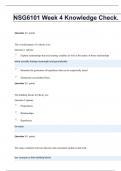
-
NSG6101 Week 4 Knowledge Check.
- Tentamen (uitwerkingen) • 4 pagina's • 2024
-
 QUICKEXAMINER
QUICKEXAMINER
-
- $11.49
- + meer info
NSG6101 Week 4 Knowledge Check. Question 1 (1 point) The overall purpose of a theory is to: Question 1 options: Explain relationships that exist among variables as well as the nature of those relationships Stimulate the generation of hypotheses that can be empirically tested Summarize accumulated facts Question 2 (1 point) The building blocks for theory are: Question 2 options: Propositions Relationships Hypotheses Question 3 (1 point) T...
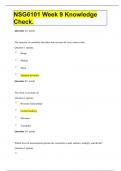
-
NSG6101 Week 9 Knowledge Check.
- Tentamen (uitwerkingen) • 3 pagina's • 2023
-
 EXAMINER001
EXAMINER001
-
- $4.99
- + meer info
NSG6101 Week 9 Knowledge Check. Question 1 (1 point) The measure of variability that takes into account all score values is the: Question 1 options: Range Median Mean Standard deviation Question 2 (1 point) The mode is an index of: Question 2 options: Bivariate relationships Central tendency Skewness Variability
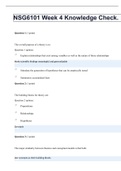
-
NSG6101 Week 4 Knowledge Check.
- Tentamen (uitwerkingen) • 4 pagina's • 2023
-
 EXAMINER001
EXAMINER001
-
- $9.99
- + meer info
NSG6101 Week 4 Knowledge Check. Question 1 (1 point) The overall purpose of a theory is to: Question 1 options: Explain relationships that exist among variables as well as the nature of those relationships Stimulate the generation of hypotheses that can be empirically tested Summarize accumulated facts Question 2 (1 point) The building blocks for theory are: Question 2 options: Propositions Relationships Hypotheses Question 3 (1 point) T...

Vraag jij je af waarom zoveel studenten in mooie kleren lopen, geld genoeg hebben en genieten van tonnen aan vrije tijd? Nou, ze verkopen hun samenvattingen op Stuvia! Stel je eens voor dat jouw samenvatting iedere dag weer wordt verkocht. Ontdek alles over verdienen op Stuvia

